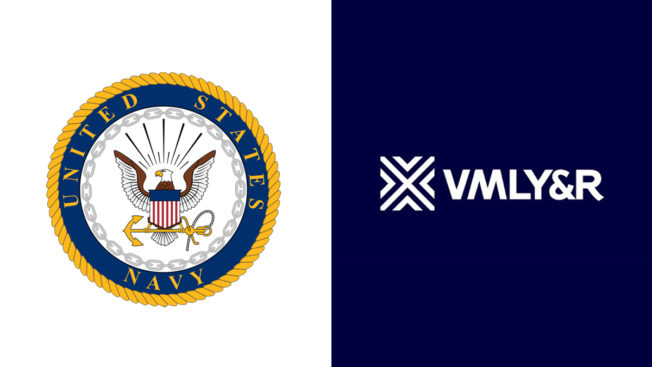Don't miss ADWEEK House at Cannes, June 16-19. Join us as we celebrate our 45th anniversary and explore the industry's now and next. RSVP.
Earlier this week, the U.S. Navy announced it would be retaining VMLY&R as its agency of record, marking a big win for the WPP subsidiary. With its $650 million-plus Census 2020 campaign coming to an end, winning another five-year, $455 million-plus contract with the Department of Defense keeps the agency’s public sector portfolio firmly intact.
The team at VMLY&R can breathe a sigh of relief, but the rest of the industry might have cause for concern.
There have only been a few government contracts that rival the value of the U.S. Navy award in recent years, and none have been so hotly contested.
In 2017, True North Communications (a joint-venture led by IPG’s FCB), secured a $625 million public health campaign for the Food and Drug Administration. There were two total bids.
In 2018, Omnicom’s GSD&M successfully retained its recruitment work with the U.S. Air Force, an award valued at $741 million. There was only one challenger.
Later in 2018, Omnicom’s DDB secured the highly contested $4 billion U.S, Army recruitment contract, beating out four other bidders.
In 2019, WPP’s Wunderman Thompson retained its $529 million recruitment contract for the U.S. Marines. There were three total bids.
Last year, Publicis’ PlowShare Group retained its National Tobacco Educational Campaign at Centers for Disease Control and Preventions. The $548 million contract only received two bids.
To secure the recent Navy award, the incumbent had to rise above a field that included 10 firms in all. For a contract of this size, that’s a staggering number. Given the extensive scope of these contracts, very few firms in the industry are equipped to pursue them. They are typically reserved for holding companies or extremely large independents. Moreover, it’s rare that a challenger agency successfully topples an incumbent after a single contract cycle. Each of the awards mentioned above was retained for at least one contract cycle (and recruitment duties for the Marines haven’t changed hands since around World War II).
In the wake of a global pandemic that rocked the industry in 2020, it’s no secret that agencies are looking for new paths to revenue and diversification. Government work offers unique opportunities for reliable, robust revenue and the security of longer-term contracts.
There has been a notable uptick in new entrants into the public sector market. Likewise, established players are beginning to make a more concerted effort to expand their public sector portfolios. Each of the major holding companies vied for the recent Navy award, and some even entered multiple agencies into the competition.
Advertising agencies aren’t the only ones pursuing these contracts. The Navy bid provides further evidence that leading consulting firms are expanding their efforts to win public sector advertising work. Both Accenture and Deloitte competed for the contract, and given their recent moves (Accenture’s acquisition of Droga5 in 2019 and Deloitte’s hiring of former Ogilvy exec Leslie Sims as U.S. chief creative officer), both were serious about winning. As they continue to develop their creative capabilities, it’s only a matter of time until they do.
Top consultancies have relationships across the sector at every level, and in many cases, they exert enormous influence on government decision-making. Plus, they continue to attract top creative talent, and they’re hungry. As large-scale public sector campaigns keep growing in complexity, human capital management, data analytics and other disciplines these firms have mastered will become more critical.
Consultancies like Deloitte and Accenture are some of the government’s largest service providers, generating billions of dollars in public sector revenue each year. They understand the value of government contracts, which is why they’re so intent on pursuing more. And, they know how to win. Ad agencies need to take a strategic, deliberate approach to pursuing these awards if they want to keep pace.
Those that do can compete and win in the space—it might just be a little more crowded in years to come.








